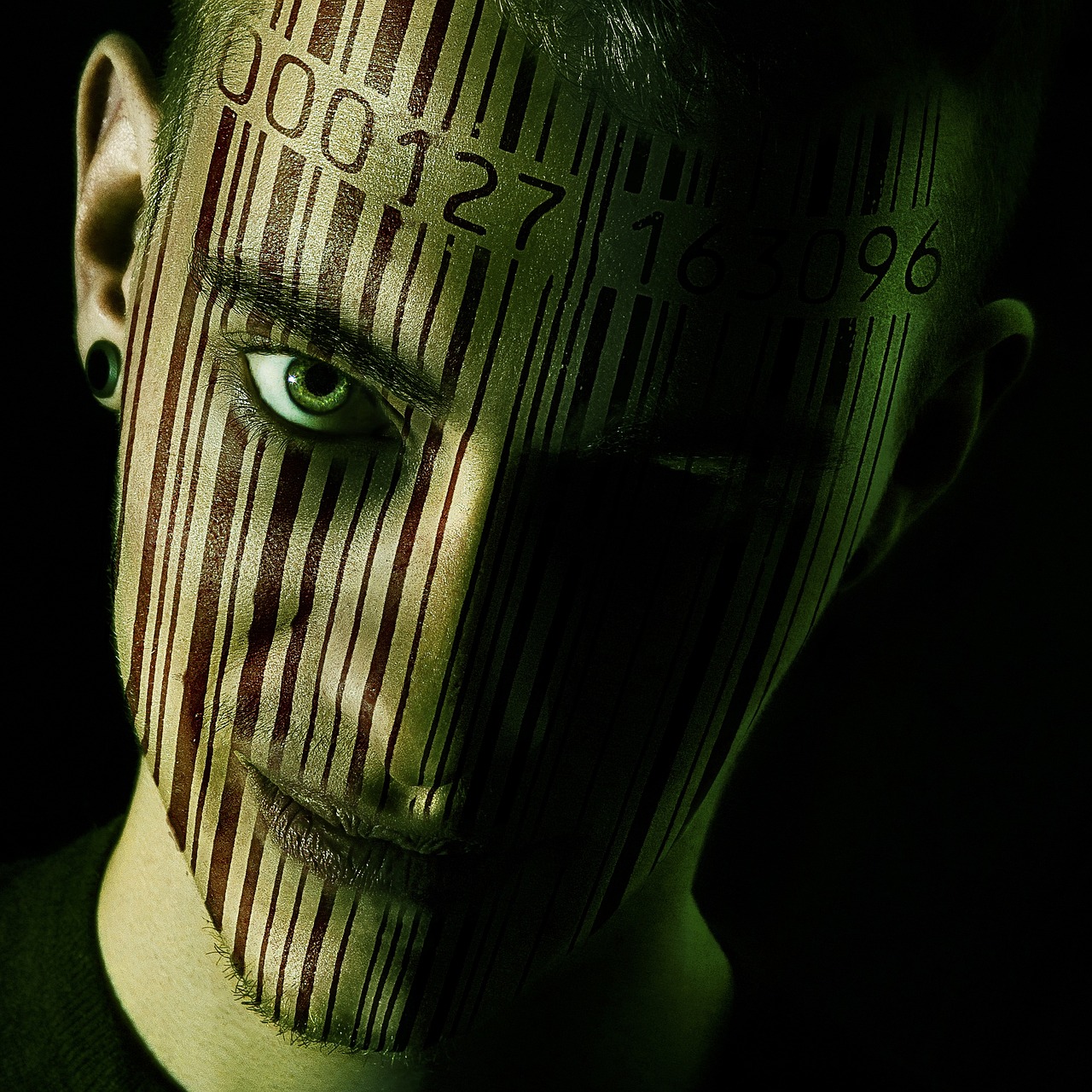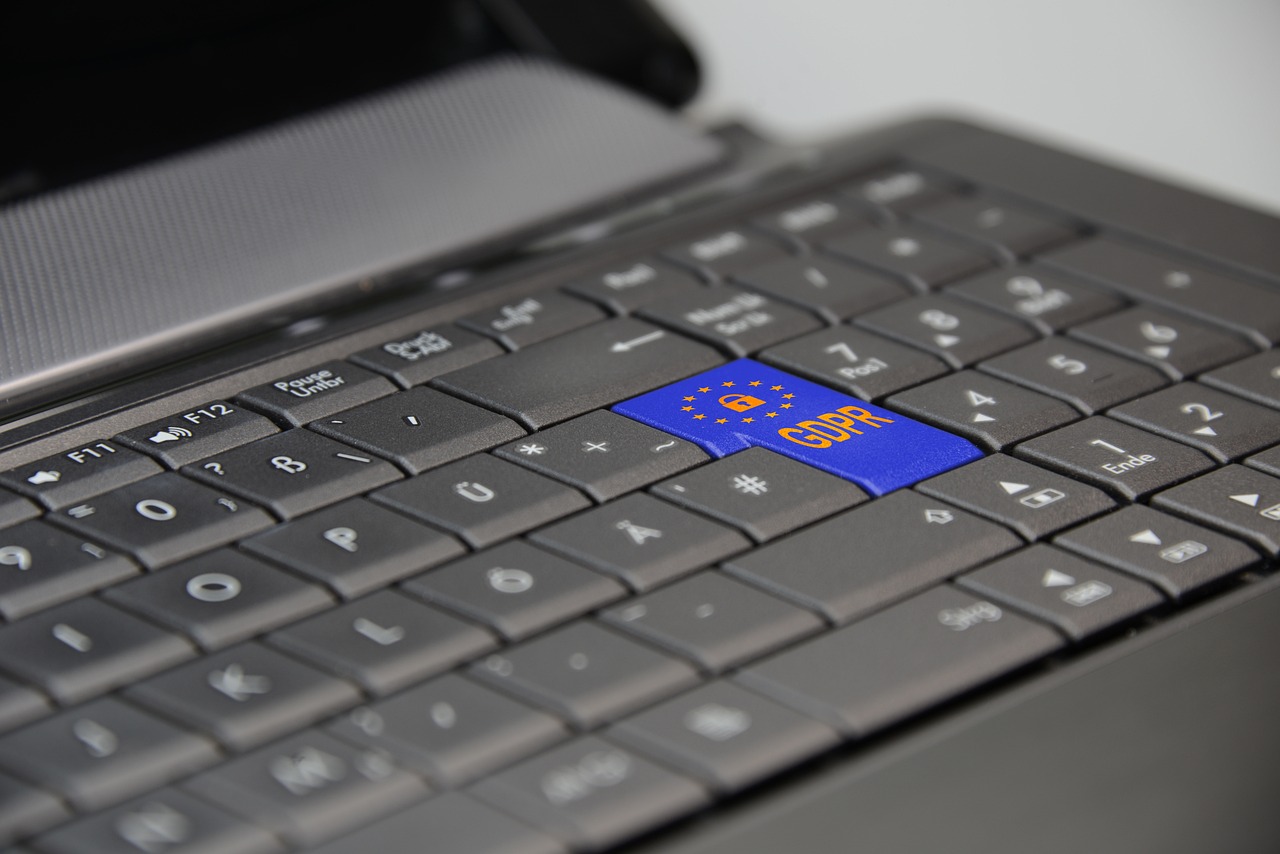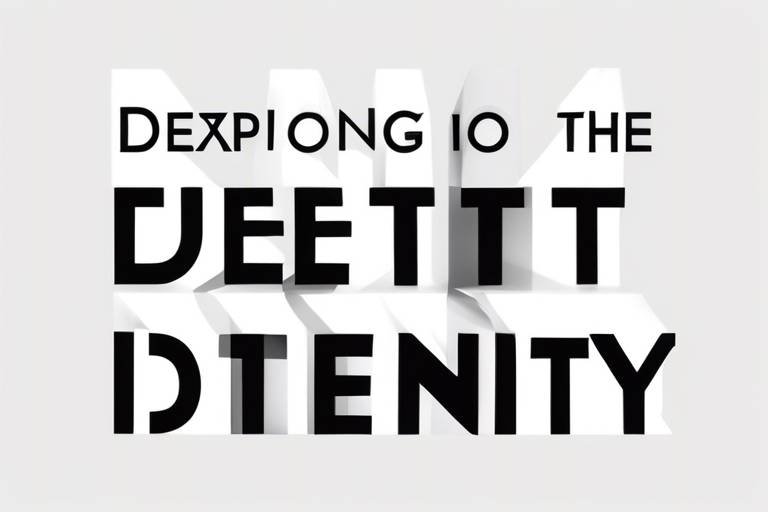Exploring the Concept of Decentralized Identity
In today's fast-paced digital landscape, the notion of identity is evolving at an unprecedented rate. With the rise of decentralized identity, individuals are gaining the power to control their personal information like never before. But what exactly is decentralized identity? Imagine a world where you hold the keys to your own data, where sharing your information is not only a choice but also a secure transaction. This concept is not just a technological innovation; it represents a fundamental shift in how we perceive and manage our identities online.
At its core, decentralized identity revolves around the idea of self-sovereignty. This means that you, the user, are the sole owner of your identity and the data that comes with it. No more relying on central authorities or third-party services that often mishandle our information. Instead, you can choose what information to share, with whom, and for how long. This shift is akin to moving from a crowded, noisy marketplace where everyone can see your business to a private room where you can have meaningful conversations on your terms.
The backbone of this innovative concept is blockchain technology. By utilizing a decentralized ledger, blockchain provides a secure and transparent way to manage identities. It eliminates the need for a central database, reducing the risk of data breaches and unauthorized access. When you think about it, blockchain acts like a digital vault, safeguarding your information while allowing you to access it whenever you need. This not only enhances security but also builds trust in digital interactions, as every transaction can be verified without exposing your sensitive data.
The implications of decentralized identity are profound. As we navigate through an era where data breaches and privacy violations are rampant, having control over our personal information is not just desirable; it's essential. This concept empowers individuals, giving them the tools to reclaim their digital footprint. With decentralized identity, the power dynamics shift from corporations back to the users, creating a more equitable digital ecosystem.
In the coming sections, we will explore the fundamental principles of decentralized identity and its myriad benefits, including enhanced privacy, security, and user empowerment. We will also discuss the challenges and limitations that this groundbreaking concept faces. So, buckle up as we dive deeper into the world of decentralized identity, where the future of personal data management awaits!

The Basics of Decentralized Identity
Understanding the foundational principles of decentralized identity is crucial in today’s rapidly evolving digital landscape. At its core, decentralized identity shifts the paradigm from traditional, centralized identity management systems—where a single entity controls and verifies identities—to a model that empowers individuals. This new approach emphasizes self-sovereignty, which means that individuals have complete ownership and control of their personal information without relying on third-party intermediaries.
The concept of decentralized identity revolves around several key principles:
- Self-Sovereignty: Users own their identities and can manage them as they see fit.
- User Control: Individuals have the power to decide who can access their data and under what circumstances.
- Blockchain Technology: This technology plays a pivotal role in enabling decentralized identity by providing a secure, transparent, and tamper-proof way to store identity information.
Imagine a world where your identity is like a digital passport that you carry in your pocket, but instead of being issued by a government, it is managed by you. With decentralized identity, you can choose to share only the information necessary for a specific purpose—like verifying your age or confirming your identity—without exposing your entire life story. This is a game-changer for privacy and security.
Moreover, decentralized identity solutions utilize cryptographic techniques to ensure that your data remains secure. This means that even if a hacker were to breach a service provider, your personal information would remain safe and inaccessible. The combination of these principles not only enhances user trust but also fosters a more secure and private online environment.
To better illustrate the importance of decentralized identity, consider the following table that compares traditional identity management with decentralized identity:
| Aspect | Traditional Identity Management | Decentralized Identity |
|---|---|---|
| Control | Centralized control by organizations | User-centric control |
| Privacy | Limited privacy; data often shared with multiple parties | Enhanced privacy; data shared selectively |
| Security | Vulnerable to centralized breaches | Secured through cryptography and blockchain |
| Data Ownership | Data owned and managed by third parties | Data owned and managed by the individual |
In conclusion, the basics of decentralized identity highlight a significant shift in how we think about personal data and identity management. By prioritizing self-sovereignty and user control, decentralized identity not only enhances privacy and security but also transforms the way we interact with digital platforms. As we delve deeper into this topic, it becomes clear that the implications of decentralized identity extend far beyond mere technology; they touch on fundamental principles of autonomy and trust in the digital age.
1. What is decentralized identity?
Decentralized identity refers to a model where individuals have control over their personal data and identity, without relying on a central authority.
2. How does blockchain technology relate to decentralized identity?
Blockchain technology provides a secure and transparent way to manage identities, ensuring that personal information is tamper-proof and under the user's control.
3. What are the benefits of decentralized identity?
The benefits include enhanced privacy, improved security, and greater control over personal data, allowing individuals to share only what's necessary.
4. Are there any challenges associated with decentralized identity?
Yes, challenges include technological barriers, regulatory concerns, and the need for widespread adoption to realize its full potential.

Benefits of Decentralized Identity
Decentralized identity is not just a buzzword; it's a revolutionary concept that brings a plethora of benefits to the table, particularly in our increasingly digital world. Imagine a scenario where you have complete control over your personal information, where you decide who sees what, and when. Sounds liberating, right? This is precisely what decentralized identity aims to achieve. By empowering individuals with ownership of their data, it transforms the way we interact online, fostering a more secure and private digital environment.
One of the most significant advantages of decentralized identity is enhanced privacy. In a world where data breaches and unauthorized access to personal information have become alarmingly common, decentralized identity solutions provide a robust shield. Users can share only the necessary information with trusted parties, minimizing their exposure to potential risks. Think of it like carrying a single key that opens only the doors you want. With decentralized identity, you can choose which aspects of your identity to reveal, thereby maintaining your privacy while engaging in online activities.
Another compelling benefit is the concept of data minimization. This principle advocates for limiting the collection of personal data to what is strictly necessary. In traditional identity systems, users often have to provide a plethora of information, much of which is irrelevant to the service they are accessing. Decentralized identity flips this narrative on its head. For instance, when signing up for a new service, instead of providing your full name, address, and social security number, you can simply share a verified credential that confirms your age or identity without disclosing extra information. This not only protects your personal data but also reduces the burden on organizations to manage and secure vast amounts of sensitive information.
Moreover, decentralized identity grants individuals unprecedented control over their personal data. In a centralized system, companies often hold the keys to your information, leaving you vulnerable to data misuse and identity theft. However, with decentralized identity, you are the custodian of your data. You can revoke access at any time, ensuring that no one can misuse your information without your consent. This level of control is akin to having a personal vault for your data, where you decide who gets access and when.
Security is another cornerstone of decentralized identity. By leveraging advanced technologies like blockchain, decentralized identity solutions provide robust security measures that are hard to breach. For example, blockchain's immutable nature means that once your identity is verified, it cannot be altered or tampered with. This significantly reduces the risk of identity theft and fraud in digital transactions. Think of it as a digital fortress, where your identity is safeguarded against intruders.
In summary, the benefits of decentralized identity are profound and transformative. By enhancing privacy, supporting data minimization, providing control over personal data, and bolstering security, decentralized identity not only empowers individuals but also paves the way for a more secure and trustworthy digital landscape. As we continue to navigate the complexities of the digital age, embracing decentralized identity could very well be the key to reclaiming our personal data and privacy.
- What is decentralized identity? Decentralized identity refers to a system where individuals have control over their own identity data, typically using blockchain technology to manage and verify their information.
- How does decentralized identity enhance privacy? It allows users to share only the necessary information with trusted parties, minimizing exposure to risks associated with data breaches.
- What is data minimization? Data minimization is the practice of limiting personal data collection to what is strictly necessary, reducing the amount of information shared with third parties.
- How does decentralized identity improve security? By utilizing blockchain technology, decentralized identity solutions provide robust security measures that protect users from identity theft and fraud.

Enhanced Privacy
In today's hyper-connected world, where personal information is often just a click away, privacy has become a paramount concern for individuals navigating the digital landscape. The emergence of decentralized identity offers a refreshing approach to privacy, empowering users to take charge of their personal data. But how exactly does it enhance privacy? Let's dive into the intricacies of this innovative concept.
Decentralized identity systems allow individuals to manage their own identities without relying on a central authority. This means that instead of having your information stored on a centralized server, which can be vulnerable to breaches and unauthorized access, your data remains in your control. Imagine having a digital vault where you can store your personal information, only sharing it when absolutely necessary. This self-sovereignty is a game-changer, as it limits the exposure of your data to potential threats.
Moreover, decentralized identity promotes the principle of data minimization. This principle advocates for collecting only the information that is necessary for a specific purpose. In a traditional identity verification process, you might be required to provide extensive personal details—think your full name, address, date of birth, and even sensitive information like your Social Security number. With decentralized identity, you can choose to share only what is needed, significantly reducing the risk of your data being misused. For instance, when verifying your age for a service, you might only need to provide your birthdate instead of a full identity profile.
Additionally, the use of advanced cryptographic techniques in decentralized identity systems ensures that your data is not just stored securely, but also transmitted securely. When you share your information, it can be done in a way that the recipient can verify your identity without having access to all your personal data. This selective disclosure feature is akin to showing your ID to prove your age without revealing your address or other identifying details. It’s a brilliant approach that enhances privacy while maintaining necessary functionality.
Furthermore, decentralized identity systems often incorporate features that allow users to revoke access to their data at any time. This means that if you no longer want a company to have access to your information, you can easily cut them off. This level of control is revolutionary, as it shifts the power dynamics of data ownership back to the individual. In a world where data is often treated as a commodity, this empowerment is not just beneficial; it’s essential.
In summary, decentralized identity enhances privacy in multiple ways:
- Self-sovereignty: Users control their own data.
- Data minimization: Only necessary information is shared.
- Secure transmission: Advanced cryptography protects data.
- Selective disclosure: Share only what is needed.
- Revocable access: Users can control who sees their information.
As we continue to embrace the digital age, the importance of maintaining our privacy cannot be overstated. Decentralized identity not only provides a solution to the growing concerns surrounding data security but also empowers individuals to reclaim their digital identities. In a landscape where privacy feels like a luxury, decentralized identity stands as a beacon of hope, reminding us that we can take back control of our personal information.
- What is decentralized identity? Decentralized identity is a system that allows individuals to manage their own identities without relying on a central authority, giving them more control over their personal data.
- How does decentralized identity enhance privacy? It enhances privacy by allowing users to store their data securely, share only necessary information, and revoke access at any time.
- What is data minimization? Data minimization is the principle of collecting only the information that is necessary for a specific purpose, reducing the risk of data misuse.
- Can I control who accesses my information? Yes, decentralized identity systems allow you to control access to your information, enabling you to revoke access whenever you choose.

Data Minimization
In the age of rampant data collection and surveillance, the principle of emerges as a beacon of hope for privacy-conscious individuals. At its core, data minimization advocates for the collection of only the essential information necessary to achieve a specific purpose. This approach not only protects personal data but also empowers users to reclaim control over their digital identities. Imagine walking into a store and only sharing your name and payment method, without divulging your entire shopping history or personal details. That's the essence of data minimization!
Decentralized identity systems inherently support data minimization by allowing users to share only what is absolutely necessary for a given transaction or interaction. For example, when verifying age for an online service, instead of providing a full birthdate, a decentralized identity could simply confirm that the user is over a certain age without revealing the exact date. This selective sharing drastically reduces the risk of data breaches and identity theft, as less information is exposed to potential threats.
Furthermore, data minimization can lead to a more trustworthy online environment. When users know that their personal information is not being collected unnecessarily, they are more likely to engage with services and platforms. This trust is crucial in fostering a healthy digital ecosystem where privacy is respected. It also shifts the power dynamics away from centralized entities that often exploit user data for profit, towards a model where individuals can dictate the terms of their interactions.
To illustrate the impact of data minimization in decentralized identity, consider the following table that compares traditional identity verification methods with decentralized approaches:
| Traditional Methods | Decentralized Identity |
|---|---|
| Requires full personal details (name, address, etc.) | Only shares necessary information (e.g., age confirmation) |
| Data stored centrally, vulnerable to breaches | Data stored on user devices, reducing breach risk |
| Users have little control over their data | Users maintain complete control over what they share |
In summary, the principle of data minimization is not just a technical requirement but a fundamental shift in how we think about our personal information. By embracing decentralized identity solutions, we can significantly reduce the amount of personal data shared online, ensuring that our digital interactions remain private and secure. This shift not only protects individual privacy but also fosters a culture of trust and respect in the digital realm, paving the way for a more secure and user-centric internet.
- What is data minimization? Data minimization is a principle that advocates for limiting personal data collection to only what is necessary for a specific purpose.
- How does decentralized identity support data minimization? Decentralized identity allows users to share only essential information, reducing the risk of data breaches and enhancing privacy.
- Why is data minimization important? It protects individuals' privacy, reduces the risk of identity theft, and fosters trust in online interactions.
- Can data minimization improve user experiences? Yes, by limiting unnecessary data sharing, users feel more secure and are more likely to engage with services.

Control Over Personal Data
In this digital era, the concept of has become a hot topic. Imagine waking up one day to find that all your personal information is scattered across various platforms, with no way to track who has access to it. Frightening, right? This is where decentralized identity steps in to save the day. With this innovative approach, individuals can regain control over their personal information, deciding who gets to see what and when.
Decentralized identity systems empower users by providing them with the tools to manage their own data. Instead of relying on third-party organizations to store and protect their information, individuals can use blockchain technology to create a digital identity that is secure, private, and entirely under their control. This means that when you share your information, you can choose to disclose only what is necessary, keeping the rest safe and sound.
One of the most significant advantages of having control over your personal data is the ability to prevent unauthorized access. Think of it as having a personal vault where you can store your most valuable possessions. You decide who gets a key and who doesn’t. This level of security is crucial in a world where identity theft and data breaches are all too common. With decentralized identity, the risk of someone exploiting your personal information decreases significantly.
Moreover, this control fosters a sense of trust between users and service providers. When individuals know they are the ones managing their data, they are more likely to engage with platforms that respect their privacy. This shift can lead to healthier online relationships and a more transparent digital ecosystem.
To illustrate how control over personal data works in practice, consider the following example: Imagine you are applying for a new job. Instead of submitting your entire resume, which may contain sensitive information like your address or previous salary, you can share a verified digital identity that confirms your qualifications without revealing unnecessary details. This selective sharing not only protects your privacy but also streamlines the hiring process.
In conclusion, the ability to control personal data through decentralized identity is not just a technological advancement; it represents a fundamental shift in how we interact with the digital world. By putting the power back into the hands of individuals, we can create a more secure, private, and trustworthy online environment.
- What is decentralized identity? Decentralized identity is a digital identity model that allows individuals to control their personal data without relying on centralized authorities.
- How does decentralized identity enhance privacy? It enhances privacy by enabling users to share only the information necessary for a specific interaction, reducing the risk of data breaches.
- Can I trust decentralized identity systems? Yes, decentralized identity systems use blockchain technology, which is inherently secure and transparent, making it a trustworthy option for managing personal data.
- What are the challenges of decentralized identity? Challenges include technological barriers, regulatory concerns, and the need for widespread adoption to be effective.

Security Implications
In a world where identity theft and fraud are rampant, the security implications of decentralized identity are nothing short of revolutionary. Imagine a digital realm where your personal information is not stored in a single, vulnerable database but is instead scattered across a network, accessible only by you. This is the promise of decentralized identity. By leveraging blockchain technology, individuals can create a secure and tamper-proof identity that is resistant to unauthorized access and manipulation.
One of the core aspects of decentralized identity is its ability to enhance security through cryptographic techniques. Each identity is linked to a unique cryptographic key, which acts like a digital fingerprint. This means that even if a hacker were to breach a centralized system, they would still be unable to access your identity without the corresponding key. This layer of security is akin to having a vault for your personal information, where only you hold the key.
Moreover, decentralized identity solutions empower users to control what information they share and with whom. This granular control significantly reduces the risk of data breaches. For instance, when applying for a service, instead of providing a complete profile, individuals can selectively share only the necessary credentials. This principle of data minimization not only protects personal information but also limits the exposure of sensitive data, making it much harder for attackers to exploit.
To illustrate the security benefits further, consider the following table that outlines the differences between traditional identity systems and decentralized identity systems:
| Feature | Traditional Identity Systems | Decentralized Identity Systems |
|---|---|---|
| Data Storage | Centralized databases | Distributed across a network |
| Access Control | Third-party control | User-controlled access |
| Vulnerability | High risk of data breaches | Resistant to unauthorized access |
| Data Sharing | Full disclosure of personal information | Selective sharing of credentials |
In addition to these advantages, decentralized identity systems can also incorporate multi-factor authentication (MFA) methods. By requiring multiple forms of verification, users can add another layer of security to their identities. This is particularly important in an age where cyber threats are ever-evolving. The combination of cryptographic keys, selective data sharing, and MFA creates a robust security framework that significantly mitigates the risks associated with identity theft.
However, it's important to note that while decentralized identity offers promising security enhancements, it is not entirely foolproof. Users must remain vigilant and adopt best practices to safeguard their keys and credentials. Just as you wouldn’t leave your house unlocked, you should ensure your digital identity is equally secure. In summary, the implications of decentralized identity for security are profound, offering individuals a powerful tool to protect their personal information in an increasingly digital world.
- What is decentralized identity? Decentralized identity refers to an identity management system that allows individuals to control their personal information without relying on centralized authorities.
- How does decentralized identity enhance security? It enhances security by using cryptographic techniques and allowing users to share only necessary information, reducing the risk of data breaches.
- Can decentralized identity prevent identity theft? While it significantly mitigates risks, users must remain vigilant and follow best practices to protect their credentials.
- Is decentralized identity user-friendly? While it offers many benefits, the user experience can vary based on the implementation and technology used.

Challenges and Limitations
While the concept of decentralized identity is revolutionary, it’s important to recognize that it’s not without its challenges. One of the primary hurdles is the complexity of implementation. The technology behind decentralized identity, often relying on blockchain systems, can be daunting for both users and developers alike. Imagine trying to navigate a labyrinth without a map; that’s how many feel when attempting to understand and adopt this new identity management system. The intricacies of blockchain technology, cryptographic principles, and interoperability between different decentralized systems can pose significant barriers to entry.
Moreover, there’s a pressing need for widespread adoption to truly realize the benefits of decentralized identity. If only a handful of companies or services implement these solutions, the ecosystem remains fragmented and less effective. Just think about the last time you tried to use a new app that your friends weren’t on yet; it felt pointless, right? The same principle applies here—without a critical mass of users and providers, the potential of decentralized identity may go unrealized.
Another significant challenge lies in regulatory concerns. The digital landscape is governed by a myriad of laws and regulations that vary from one jurisdiction to another. These regulations often lag behind technological advancements, creating a disconnect that can stifle innovation. For instance, existing data protection laws may not adequately address the unique aspects of decentralized identity, leading to confusion and potential legal pitfalls. This situation can be likened to trying to fit a square peg into a round hole; it simply doesn’t work without adjustments.
To further illustrate these challenges, consider the following table that summarizes the key obstacles faced by decentralized identity initiatives:
| Challenge | Description |
|---|---|
| Technological Barriers | Complexity of blockchain and cryptographic technologies making adoption difficult. |
| Regulatory Concerns | Existing laws not aligned with decentralized identity principles, causing legal uncertainties. |
| Widespread Adoption | Need for a critical mass of users and services to create a functional ecosystem. |
In addition, there are concerns about user education and awareness. Many people are still unfamiliar with the concept of decentralized identity, which can lead to skepticism and resistance to change. If you’ve ever tried to convince a friend to switch from their favorite app to a new one, you know how challenging it can be. The same applies here; without proper education and outreach, users may hesitate to embrace decentralized identity solutions, fearing the unknown.
In conclusion, while the potential for decentralized identity is immense, it’s clear that several challenges must be addressed. From technological barriers and regulatory concerns to the need for user education and widespread adoption, these limitations present obstacles that advocates of decentralized identity must navigate carefully. As we move forward, it will be essential to foster collaboration among technologists, policymakers, and users to unlock the full potential of this innovative approach to identity management.
- What is decentralized identity? Decentralized identity is a system that allows individuals to control their personal information without relying on a central authority.
- How does blockchain technology relate to decentralized identity? Blockchain provides a secure and transparent way to manage identities, allowing users to verify their information without intermediaries.
- What are the main benefits of decentralized identity? Key benefits include enhanced privacy, security, and user empowerment, as individuals can control their data.
- What challenges does decentralized identity face? Challenges include technological barriers, regulatory concerns, and the need for widespread adoption.

Technological Barriers
When we talk about decentralized identity, it’s like opening a treasure chest filled with possibilities. However, just like any treasure hunt, there are obstacles to overcome. The technological barriers standing in the way of widespread adoption can be quite daunting. For starters, implementing decentralized identity solutions requires a robust understanding of blockchain technology, cryptographic principles, and distributed systems. This might sound like a foreign language to many, and it can create a significant learning curve for both developers and users alike.
Moreover, the integration of decentralized identity systems into existing infrastructures poses another challenge. Many businesses and organizations are still operating on legacy systems that aren't designed to support such innovative technologies. This incompatibility can lead to a fragmented user experience, where individuals find it cumbersome to manage their identities across different platforms. Imagine trying to fit a square peg into a round hole; it just doesn’t work smoothly!
Additionally, there’s the issue of scalability. While blockchain networks are designed to be decentralized, they can sometimes struggle to handle a high volume of transactions efficiently. This can lead to slow processing times and increased costs, which are significant hurdles for businesses considering the switch to decentralized identity. To illustrate this, let’s look at a simple comparison:
| Traditional Identity Systems | Decentralized Identity Systems |
|---|---|
| Centralized control and management | Distributed control among users |
| Single point of failure | Increased resilience against attacks |
| Limited user control over data | Empowered user data ownership |
| Potentially high operational costs | Variable costs depending on blockchain usage |
As we can see, while decentralized identity systems offer numerous benefits, they also come with their own set of challenges that need to be addressed. Another significant barrier is the need for interoperability. For decentralized identity to truly shine, different systems must be able to communicate with each other seamlessly. This requires standardized protocols and frameworks, which are still in the early stages of development. Without these standards, users may find themselves stuck in silos, unable to leverage their identities across various platforms.
Lastly, we can't overlook the importance of user experience. For technology to gain traction, it must be user-friendly. If decentralized identity solutions are too complex or unintuitive, users will likely shy away from adopting them. The goal should be to create an experience that feels as natural as using a social media platform, where users can effortlessly manage their identities without a second thought.
In conclusion, while the concept of decentralized identity is revolutionary, it’s clear that several technological barriers need to be overcome for it to reach its full potential. Addressing these challenges will require collaboration across industries, innovative thinking, and a commitment to creating solutions that are not only effective but also accessible to everyone.
- What is decentralized identity? Decentralized identity refers to a digital identity system that allows individuals to own and control their personal information without relying on a centralized authority.
- How does blockchain technology play a role? Blockchain technology provides a secure and transparent way to manage identities, ensuring that personal data is not easily tampered with or misused.
- What are the main benefits of decentralized identity? Key benefits include enhanced privacy, user control over personal data, and improved security against identity theft.
- What challenges does decentralized identity face? Challenges include technological barriers, regulatory concerns, and the need for widespread adoption.

Regulatory Concerns
As we dive deeper into the world of decentralized identity, it's essential to recognize the that accompany this transformative shift. While the concept promises greater control and security over personal data, it also raises a plethora of questions regarding compliance with existing laws and regulations. For instance, how do decentralized identity solutions fit within frameworks like the General Data Protection Regulation (GDPR) in Europe or the California Consumer Privacy Act (CCPA) in the United States? These regulations are designed to protect user data, but they often rely on traditional, centralized models of identity management.
One of the primary challenges is that current regulations may not be adequately equipped to handle the nuances of decentralized systems. Traditional models typically involve a central authority that verifies and manages identities, whereas decentralized identity operates on the principle of self-sovereignty. This means that individuals have the power to manage their own identities without needing a third party. The clash between these two paradigms can create a regulatory gray area, where it's unclear who is responsible for compliance and data protection.
Moreover, the lack of a unified regulatory framework can lead to inconsistencies in how decentralized identity is implemented across different jurisdictions. This inconsistency can hinder the adoption of decentralized solutions, as organizations may hesitate to invest in technologies that could be deemed non-compliant or face legal challenges. To illustrate this point, consider the following table that outlines some key regulatory challenges:
| Regulatory Challenge | Description |
|---|---|
| Compliance with Existing Laws | Decentralized identity must navigate complex legal landscapes, often conflicting with traditional identity management frameworks. |
| Data Ownership and Control | Determining who owns the data and how it can be used poses significant challenges. |
| Cross-Border Data Transfers | Different countries have varying regulations regarding data transfer and storage, complicating the use of decentralized identity solutions. |
| Liability Issues | In a decentralized model, it's unclear who is liable in the event of a data breach or misuse of identity. |
To address these concerns, there is a growing need for adaptable policies that can accommodate the unique characteristics of decentralized identity. Policymakers must engage with technologists and industry leaders to create regulations that not only protect users but also promote innovation. This collaborative approach could lead to a regulatory environment that supports the growth of decentralized identity while ensuring that individuals' rights and privacy are safeguarded.
In conclusion, while decentralized identity holds great promise for enhancing user control and privacy, navigating the regulatory landscape remains a significant hurdle. As the technology evolves, so too must the legal frameworks that govern it. Without proactive measures and clear guidelines, the full potential of decentralized identity may never be realized.
- What is decentralized identity? Decentralized identity is a model that allows individuals to manage their own identities without relying on a central authority.
- How does decentralized identity enhance privacy? It enables users to share only the necessary information, minimizing data exposure.
- What are the main regulatory concerns? Key concerns include compliance with existing laws, data ownership, cross-border data transfers, and liability issues.
- Can decentralized identity solutions comply with GDPR? Yes, but they must be carefully designed to align with the principles of data protection and user rights.
Frequently Asked Questions
- What is decentralized identity?
Decentralized identity refers to a digital identity model that allows individuals to control their personal information without relying on a central authority. It empowers users to manage their data through blockchain technology, ensuring privacy and security.
- How does decentralized identity enhance privacy?
Decentralized identity enhances privacy by minimizing the amount of personal data shared with third parties. Users can choose what information to disclose and to whom, significantly reducing the risk of data breaches and unauthorized access.
- What are the benefits of using decentralized identity?
The benefits of decentralized identity include enhanced privacy, improved security against identity theft, and greater user empowerment. It transforms online interactions by allowing individuals to have full control over their personal data.
- What challenges does decentralized identity face?
Despite its advantages, decentralized identity faces challenges such as technological barriers, regulatory concerns, and the need for widespread adoption. These hurdles must be addressed to ensure seamless integration and user experience.
- How does blockchain technology play a role in decentralized identity?
Blockchain technology is crucial for decentralized identity as it provides a secure, tamper-proof ledger for storing identity information. This ensures that users have ownership of their data and can manage it without interference from centralized entities.
- Can decentralized identity prevent identity theft?
Yes, decentralized identity can significantly reduce the risk of identity theft. By giving users control over their data and minimizing the information shared, it becomes much harder for malicious actors to access sensitive personal details.
- Is decentralized identity widely adopted?
While decentralized identity is gaining traction, it is not yet widely adopted. The technology is still developing, and increased awareness, education, and regulatory support are needed to encourage broader implementation.
- What is data minimization in the context of decentralized identity?
Data minimization is a principle that advocates for limiting the collection and sharing of personal data. In decentralized identity, this principle is supported by allowing users to share only the necessary information required for a specific interaction.



















